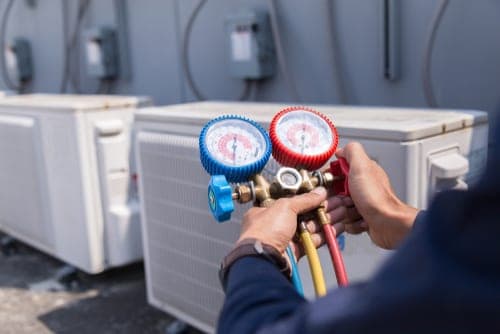Schedule Your System Inspection Today with DMAKS HVAC Experts.
Schedule Your System Inspection Today with DMAKS HVAC Experts.
Blog Article
Energy-Efficient A/c Solutions to Conserve on Energy Costs
As power prices remain to rise, the value of energy-efficient a/c systems ends up being progressively noticeable. These systems not just assure considerable cost savings on utility expenses but also add to an extra sustainable future by decreasing power usage. With various choices available, including geothermal warmth pumps and ductless mini-splits, property proprietors encounter a wide range of selections that can boost convenience and air high quality. Nevertheless, comprehending the vital functions and upkeep requirements is crucial to maximizing these advantages. What aspects should be focused on when selecting the right system for your requirements?
Benefits of Energy-Efficient HVAC Solutions
Energy-efficient A/c systems supply numerous benefits that extend beyond simple expense financial savings. By consuming much less power, these systems add to lower greenhouse gas emissions, assisting to combat environment adjustment and promote sustainability.
Furthermore, energy-efficient a/c systems frequently provide boosted comfort degrees. Most of these systems feature sophisticated innovation that permits much better temperature control and enhanced air top quality (DMAKS HVAC). This leads to a much healthier interior setting, which is specifically important for people with allergic reactions or breathing problems
Additionally, investing in energy-efficient cooling and heating systems can boost home value. As more consumers focus on energy efficiency, homes and structures outfitted with these systems might bring in higher bids in the real estate market.
Kinds Of Energy-Efficient A/c Options
How can home owners and organizations pick one of the most suitable energy-efficient cooling and heating choices for their requirements? The market provides a selection of energy-efficient a/c systems, each created to enhance convenience while reducing energy intake.
One choice is the variable refrigerant circulation (VRF) system, which efficiently regulates the temperature level in several zones within a structure. This system adapts its refrigerant circulation to match the preferred temperature level, causing substantial power savings.
An additional popular selection is geothermal heat pumps, which utilize the planet's stable temperature level to heat and great areas. By transferring warm to and from the ground, these systems show remarkable effectiveness, specifically in moderate climates.
In addition, ductless mini-split systems provide an energy-efficient choice for homes lacking ductwork. These systems permit zone-specific heating & cooling, decreasing power waste in unoccupied areas.
Lastly, high-efficiency heaters and air conditioning unit, with innovative SEER and AFUE ratings, provide dependable climate control while taking in less energy than conventional models. By assessing these alternatives, homeowners and services can select a cooling and heating system tailored to their particular requirements and power efficiency objectives.
Key Functions to Take Into Consideration

Following, examine the sort of compressor utilized in the system. DMAKS HVAC. Variable-speed compressors can readjust their outcome to match the heating or cooling demand, bring about improved convenience and energy financial savings compared to single-speed versions. Furthermore, try to find systems equipped with wise thermostats that provide programmable settings and remote gain access to, enabling better control over energy consumption
Another critical function is the system's air filtration ability. High-efficiency filters can enhance interior air quality and reduce power usage by ensuring the system operates efficiently. Take into consideration the type of refrigerant made use of; modern-day systems usually utilize environmentally friendly cooling agents that have a reduced environmental effect.
Last but not least, make certain that the system works with zoning innovation, which permits personalized temperature control in different areas of your home, enhancing convenience while reducing energy use.
Tips for Choosing the Right System


Following, consider energy effectiveness scores, particularly the Seasonal Power Performance Ratio (SEER) for cooling down systems and the Yearly Gas Application Performance (AFUE) for heating unit. Higher scores indicate better effectiveness, which can cause substantial financial savings on energy bills gradually.
In addition, evaluate the type of a/c system that best suits your way of living and spending plan. Options consist of air conditioning, ductless mini-splits, and heat pumps, each with its own collection of benefits and disadvantages.
Don't forget the significance of correct installation and sizing; an improperly sized system can result in ineffectiveness and increased wear. Finally, investigate this site speak with a professional a/c service provider to get professional suggestions tailored to your home's distinct needs. This thorough strategy will certainly guarantee that you pick an energy-efficient a/c system that meets your demands and budget properly.
Maintenance for Optimal Performance
When the ideal cooling and heating system remains in area, ongoing maintenance becomes key to ensuring optimum effectiveness and long life. A properly maintained system runs more successfully, leading to reduced energy usage and minimized energy bills. Regular evaluations and tune-ups must be arranged a minimum of two times a year-- once before the cooling season and once prior to the heating season.

Homeowners must likewise be vigilant about checking their a/c system's performance. Unusual sounds, fluctuating temperature levels, or increased energy costs can indicate underlying problems that call for immediate interest. By resolving these worries promptly, house owners can prevent expensive repair services and expand the life expectancy of their systems.
Spending in an upkeep plan with a qualified professional not just more info here boosts efficiency however additionally gives assurance, understanding that the system is operating at its finest. DMAKS HVAC. Routine upkeep is consequently important for sustaining energy performance and reducing overall operational expenses
Final Thought
In final thought, energy-efficient HVAC systems present a practical service for decreasing utility costs while enhancing comfort and air high quality. By integrating sophisticated modern technologies and options such as geothermal warm pumps and ductless mini-splits, residential property proprietors can accomplish considerable energy savings and contribute to environmental sustainability. Careful factor to consider of system attributes and recurring maintenance additionally makes certain optimum performance, making energy-efficient systems a prudent investment for both more info here financial and ecological benefits.
Report this page